Dialect 2 News
Football Trainers Tasos Christofileas, Head of Men’s football PSAPP and Nana Plexida, football trainer are sharing their football3 experiences in short video testimonials.
Watch them below:
IMG_2415
Football Trainers Tasos Christofileas, Head of Men’s football PSAPP and Nana Plexida, football trainer are sharing their football3 experiences in short video testimonials.
Watch them below:
IMG_2415
One of the objectives of Dialect2 is to activate and stimulate a dialogue with public institutions to highlight the importance of the right to sport for young people and to make clear how this theme intersects with other socially relevant ones (right of citizenship, territorial protection…). At the end of the project activities, Emanuela Ferrante, Assessore allo Sport e alle Pari Opportunità del Comune di Napoli shared her message to the consortium:
“The promotion of sport as a tool to tackle discrimination through inclusive football, as emerged during the in-depth workshop discussion held at the CONI Campania headquarters, has highlighted the urgency of the substantial affirmation of the right to sport for the most disadvantaged young people. It is possible to overcome exclusion and marginalization through the commitment of the institutions and the diffusion of a new inclusive sport method related practices on the metropolitan area. DIALECT2 has showed the crucial role of fighting stereotypes through the promotion of a healthy link between sport and digital media used, especially among the youngest, such as main, if not exclusive, socialization tools. The Municipality will continue its engagement in the DIALECT program with the aim of fostering the results on a local level”.
The Metro Park Stadium in Bagnoli in Naples becomes the beating heart of a unique initiative that combines sport, education and social inclusion. Saša, Carlo, Mattia, Hafiza, Christian, Luigi, Fatima, Praeedip, Claudia, Mario are just some of the over 60 boys and girls, born in Naples and other parts of the world, who meet in Bagnoli to play Football3.
Coming from different social and family backgrounds, the young men and women athletes came together thanks to the network built by us at ActionAid together with local associations, informal groups and the ASD Sant’Anastasia-Peluso Academy football school.
The Dialect2 and Football3 Project
Football3 is not just football: it involves three periods of play and integrates moments of reflection and discussion to manage anger and conflicts, promote fair play and fight discrimination. For over three years we have been spreading this methodology through the European Dialect project, active in Italy, Greece, Hungary and Serbia, where a total of 450 young people between the ages of 10 and 25 are involved.
The tournament is coordinated by four young mediators: Mattia, Bruno, Hafiza and Fatima, who have just turned 18. The mediators guide the participants in choosing the rules of the game and support them in reflecting on their behaviour, assigning fair play points for those who respect the rules and are able to maintain a calm and respectful atmosphere during the game. Mediators play a crucial role in resolving conflicts, becoming trusted figures for children.
Stories of integration and the future
Hafiza and Fatima are two Afghan sisters in their twenties who arrived in Italy in 2021, after the evacuation of Kabul. They have found their home in Naples and are studying medicine and economics respectively and hope to one day return to Afghanistan.
Through the Dialect2 project, with the role of mediators, they found a way to feel like a bridge between adults and adolescents, but also between different languages and cultures, becoming protagonists and an active part of the success of the Football3 method.
“Combining the practice of inclusive sport and the ability to understand digital media and their dynamics to escape clichés and prejudices is the recipe chosen by ActionAid to propose a new interaction between peers, new forms of sociality between minors and young adults who have not been given such opportunities until now and who may have real alternatives to what they find themselves experiencing, even very difficult ones, in their lives” commented Daniela Capalbo, ActionAid manager in Naples, who has been dealing with the project for years
On Tuesday, September 24th, the DIALECT2 project held its final activity, bringing together sports organizations and associations from across the globe. The online event was organized by ActionAid Hellas, Common Goal, and the Panhellenic Professional Football Players Association (PSAPP).
During the event, project partners presented the work completed throughout the project’s duration, highlighting key results and its overall impact. Professionals from Europe, Africa, and South America participated in the session, gaining valuable insights into the DIALECT2 methodology. The event also fostered a dynamic dialogue on how the methodology could be adopted and implemented by participating organizations worldwide.
On the 10th of September, a local workshop was organized by ActionAid Italia at the headquarters of Coni Campania, the Italian national Olympic Committee.
The workshop was attended by several social organizations, sports associations, football academies, representatives of political and sports institutions. The goal was to identify anti-radicalization practices and media literacy activities (inspired by the DIALECT2 model) to be integrated into football academies’ work, to strengthen the critical thinking of young players and citizens. The aim of the whole path is to enhance young people’s resilience against extremist and violent opinions through football and sports, involving them in the co-design of action plans adapted to the local context.
After several hours of presentations, reflections, debates and discussions, the workshop came up with some recommendations on these three topics, which have been shared with the rest of the European partnership at the workshop in Athens the 16th of September.
A very important contribution to the discussion was given by the young boys and girls participating in the project, as well as the mediators, who interacted as equals with representatives of political and sporting institutions during the workshop, not only bringing forward the concrete demands that emerged during the project, but also displaying an awareness of the relationship between sport and the improvement of social and collective life, at three hundred and sixty degrees, which at times appeared greater than that of their adult ‘counterparts’. Probably, another result of the reflection process that the DIALECT2 project has stimulated, and which could potentially extend beyond its borders.
#DIALECT2 came to an end! The results of the program were presented to the final conference on Monday 16th of September in the center of Athens, Greece. During the event, representatives from #DIALECT2 consortium: ActionAid Hellas, ActionAid Napoli, Football Friends, Oltalom Sportegyesület, ΕΚΚΕ, Norsensus Mediaforum and Psapp presented their outcome and experience of the program in short speeches. The protagonists of the conference were the adolescents of the four countries local teams, that shared their experience of learning the football3 methodology. 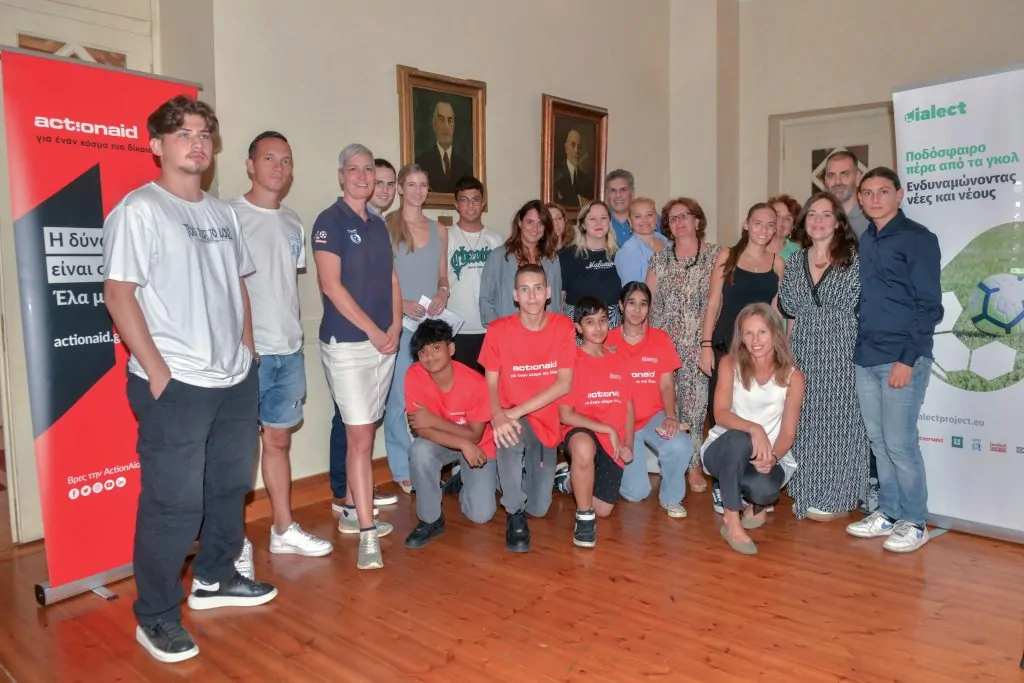
The conference ended with a policy roundtable among journalists and sport associations representatives in the below subjects:
#ActionAidHellas continues to spread the message of #SportsForInclusion in Greece, promoting equal rights against violence, xenophobia and racism.
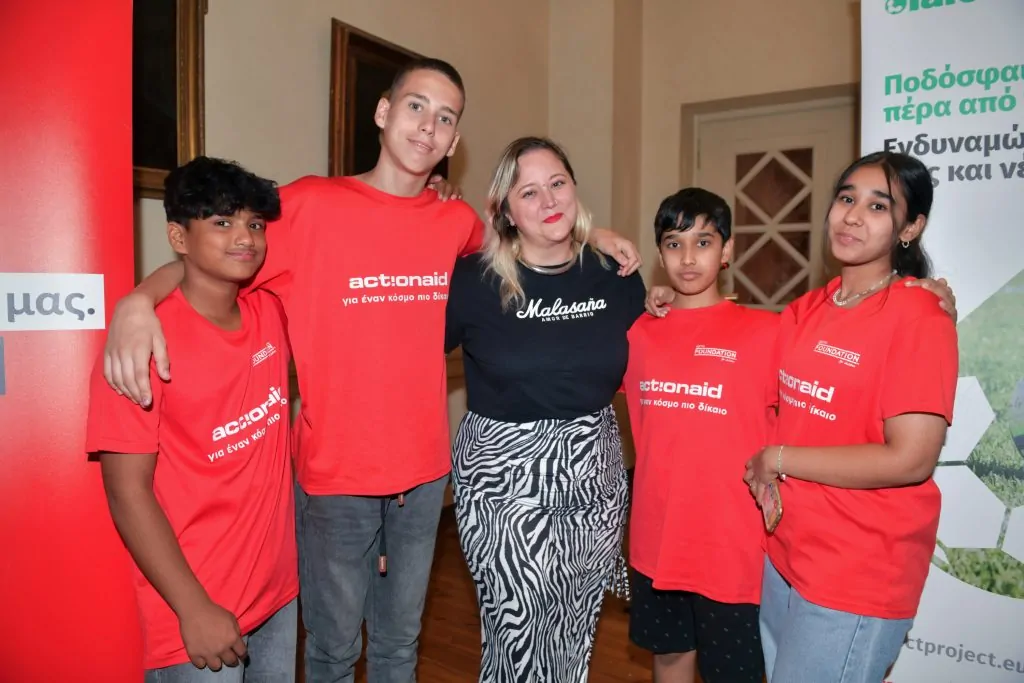
As part of the Dialect2-Combating youth radicalization: Building communities of tolerance combining football with media and digital literacy program, on the 18th May, Oltalom Sport Association organized the celebration event with plenty of celebration in it. The event took place on a Saturday afternoon, following the regular football training of the organization, since in that time and location, we could engage more participants.Athletes from all age groups were invited to take part in the event.
Since Oltalom has been using the methodology of football3 for more than a decade, and as part of football3, we encourage our players to celebrate not only their own, but also their peers and opponents achievements. During matches, athletes are fostered to celebrate the goal of the opponent teams as well. We believe that this is a gesture that doesn’t always come naturally, and in the heat of a game, sometimes saluting our own performance is also forgotten. Therefore we decided to do a penalty shootout contest, where your goal only counts if you make a proper goal celebration. Just like in football3, not only your ability to win a match, or in this case, to shoot a penalty, was important, but also to show a bit of an extra effort to show that you try to come out of your comfort zone and exhibit your creativity.
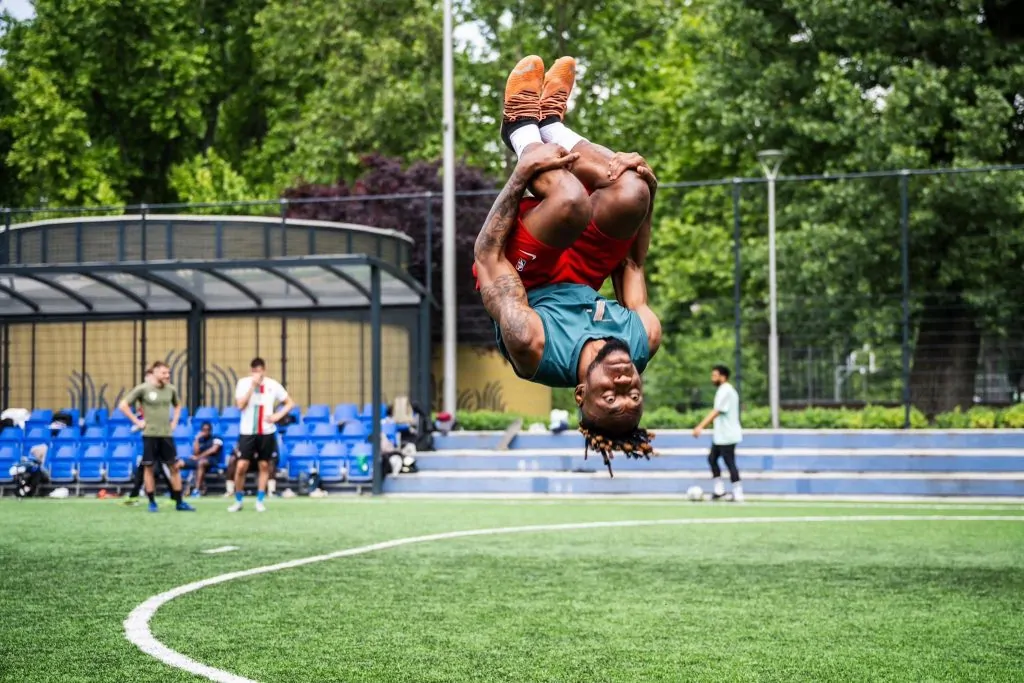
Participating athletes were divided into two groups based on their age and in some cases, based on their abilities. As some of the players didn’t want to participate as shooters, they were invited to act as an independent jury who delivers scores based on the performance of the celebration.
As the project was also about media literacy, the kids recorded the celebrations, edited together in a video, which was shared amongst others with athletes, friends and supporters of the organization. Then everyone could vote for their favorite.Beside the jury on the spot, extra points could be gained from an online audience. There was football, celebration and video making at the same time.
Upon the penalty shootout, the whole event was completed with a fun football match for the best penalty scorers. The venue of the celebration event was the Városligeti Miniaréna, one of Budapest’s central parks, thus several passers-by joined the event. We believe that the program provided a fun afternoon for participants who could feel safe enough to show attempts to open their creativity.
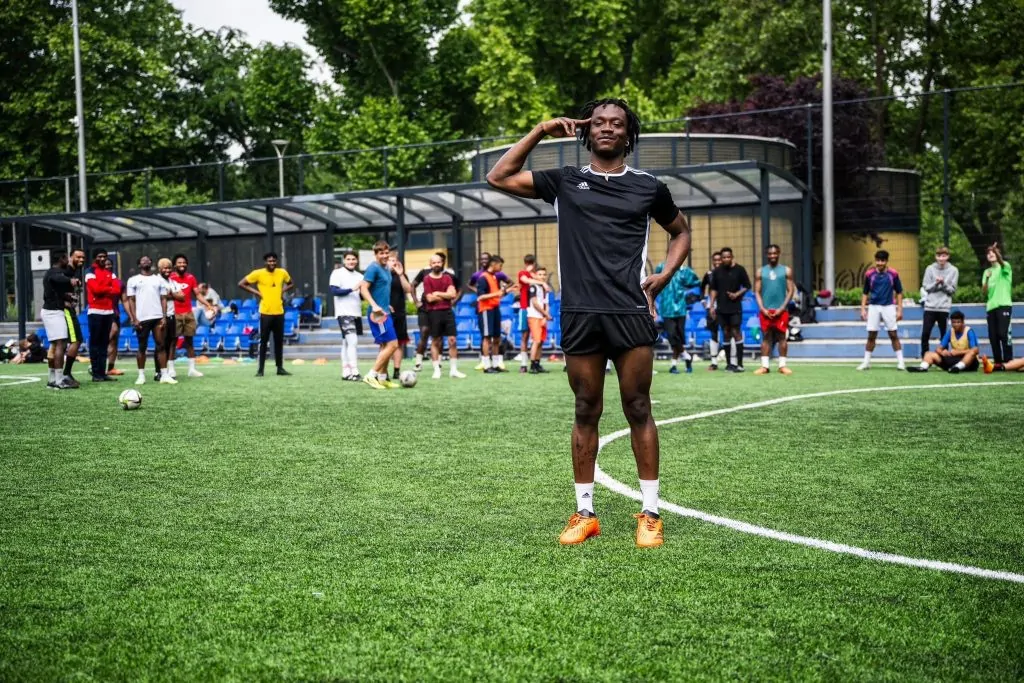
Oltalom Sport Association uses the unique power football has in creating a receptive environment that foster social inlcusion of refugees and third country nationals residing in Hungary, with a special focus in girls who don’t have previous experience in playing sport with their male peers or playing sport at all in their country of origins.
Early Saturday morning in the City Park, one of the biggest public green areas of Budapest, the capital of Hungary. Six girls are playing together with two adolescenst, they are having a game according tot eh Homeles World Cup rule system. The girls are preparing for their ever first HWC tournament in France, whereas the two male athlete are already ’senior’ HWC players, have been to several tournaments and now they are here to assist the girls’ process before their own training session starts. 
It is one of those hot summer days, when already at 8.30, everyone is sweating. However, that doesn’t keep Shira from wearing a headscarf known as a characteristic for women in Islamic cultures. The scene is the regular Saturday training of Oltalom Sport Association, delivered since 2005 at the same time (Saturday morning). Right now the girls are by themselves, having a bonding and learning experience disguised in a football training. However, soon they will join the rest of the team on the big pitch, and will play matches in mixed teams with the boys.
The organization is known to be a safe haven for marginalised groups, where children can experience a childhood without suffering from mental and physical atrocities. Therefore the trainings are quite diverse in terms of language, religion, cultural ot ethnical backgrund. If you listen carefully, you could hear at least three languages (Hungarian, English, Arabic). Athletes are training and playing together in mixed team, a fact that in many of their countries of origin would have been unimaginable. Here, the shared experience and passion will become an everyday reality, where they can still keep their traditions as they wish.
Doing sport for girls is not always common in the areas they come from. However, at Oltalom, trainings and activities are organized with social work informed care with special attention to he cultural traditions of the players. Oftentimes our female players are coming from communities, where girls and women are not valued in the same way as men are. They lack a healthy relationship model with the opposite gender, which often leads to their exploitation by their peers and also by their caretakers.

Oltalom works with the vision to prevent fall out from society and to enhance social inclusion of at-risk and marginalised groups by using the power of sport. Following that idea, together with trainings, we offer gender based social assistance based on our players’ actual needs and strive to engage them in various, individual or group social work activities.
Experiencing the sense of belonging is essential for one’s social integration, which is fostered by knowing the culture of the host society. Researches have been proved that in order to foster one’s inclusion into the new environment, the hosting milieu should be sensitized equally. Through the Fair Play Football Roadshow initiative invented by OSA in 2012, the Association offers a chance to both newcomers and longtime inhabitants to be able to adjust to the un- or less known on the football pitch. where with the use of football3, we aim to foster social inclusion and tolerance not only for our players but also for members of the host society. Our belief is that if the majority of the society sees and experiences representatives of minority groups in different roles than it is conveyed by mainstream media, it can foster a change in people’s mindset. Positive experiences can turn into changes in the attitudes which will find their ways into everyday life situations.
During the tournaments we aim to bring closer different social groups living next to each other, who, in their everyday life usually don’t, or rarely engage in conversation, and if they do so, most of the time these dialogues are full of tensions and in extreme cases, hatred. Encourage a dialogue between the two groups in a safe environment, with the emphasize on their shared passion, during a football3 game where they need to come to an agreement regarding their own game, with the presence of a football3 mediator might be a start for the groups to find a channel to each other, through which they are able to start, maintain, and with time improve a positive and progressive relationship which also serves their local community. Our aim is that they reach a level, where instead of only living next to each other, they rather live together.
Though addressing trauma and adversity migrant and refugee players went through is essential for physical and mental well-being, it is also crucial to focus on resilience factors for their successful social integration which fact is emphasized in every sport and social activity offered by Oltalom Sport Association for its players.
The Homeless Euro 24 Championship was held in Hamburg, Germany, as an official side event of the official European Football Championship where Hungary was represented by the Oltalom Sports Association from june 16-22.
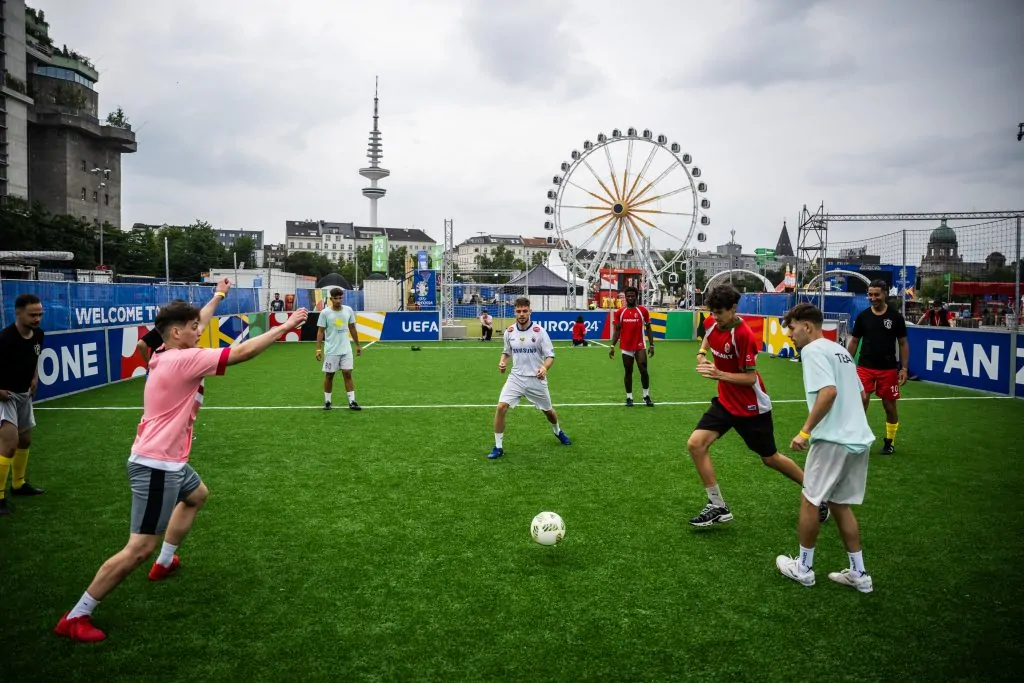
We started preparing and selecting the team months before the tournament, but ironically we found out on the penultimate day that our refugee goalkeeper from Afghanistan did not receive back his travel document from the immigration office which he gave them months before to renew it, so he could not join us, so we had to replace him with a younger player, with a kid from a children”s home, and get the allowance papers signed immediately by his guardian.
Of course, the day of the trip was not without excitement, as the player chosen to replace our player who had dropped out fell asleep, and it was only through the ingenuity of our coach that he too was able to get on the road.
Just like in the training sessions, the traveling team was made up of several nationalities: 5 Hungarians, one from Nigeria, one from Libya and one from Cameroon.
A great extra positive aspect of the trip was that in Hamburg we could reunite with two of our ex players now living in Germany. A refugee from Afghanistan who currently is living one hour from Hamburg, but in 2023 he was the one who came to the most training in the whole Oltalom team, he came to support us. Also another refugee from Albania, who had to leave Hungary many years before, came all the way from Dusseldorf and lived in our hotel and was helping the team throughout the whole week.
We reached the semi-finals of the tournament in good spirits, finishing top of our group, where a 5-2 win over Romania meant we reached the final. By the final, our players were already tired, so the trophy was lifted by a Lithuanian team consisting of more experienced players.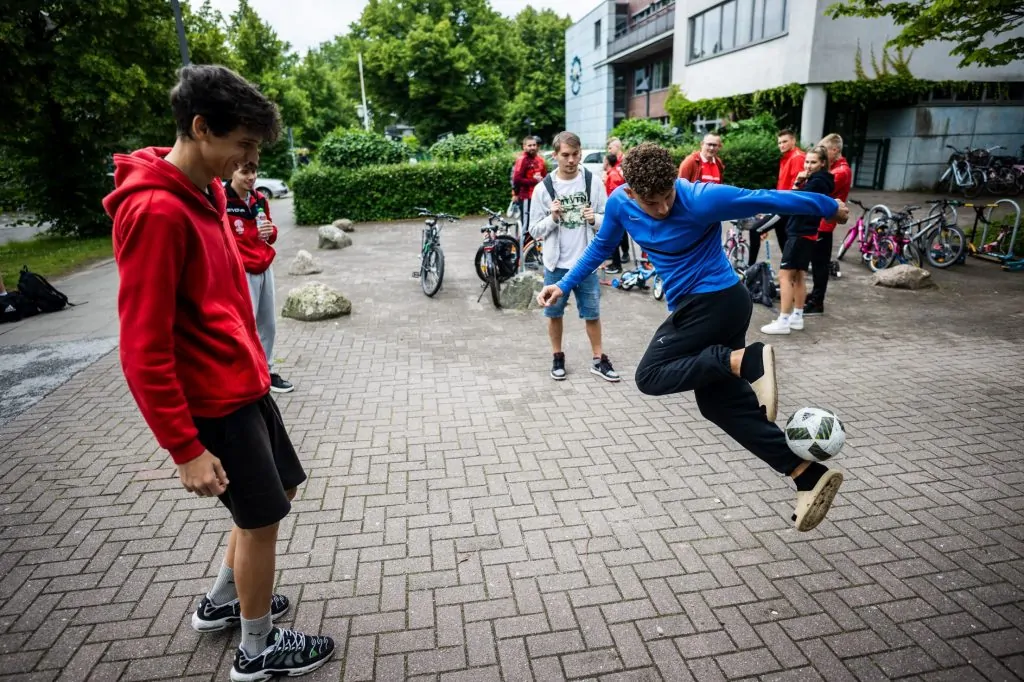
We were not the best team at the end of the tournament, but Emmanuel was the best player, who was praised for his football skills and for his particularly fair behavior.
Partner organizations from Greece, Italy, Serbia and Hungary came together to create one awareness-raising video. All organizations worked with their local football teams in order to develop a video that showcases that football can be a wonderful means of bringing people together. The video aims to inform the public about the work the organizations are doing with DIALECT2 project in their countries for the past 2 years and the continuous effort to eliminate discriminatory behaviors and xenophobia through the methodology of football3. 
The video is available in English, Greek, Italian, Hungarian and Serbian.
Watch here.